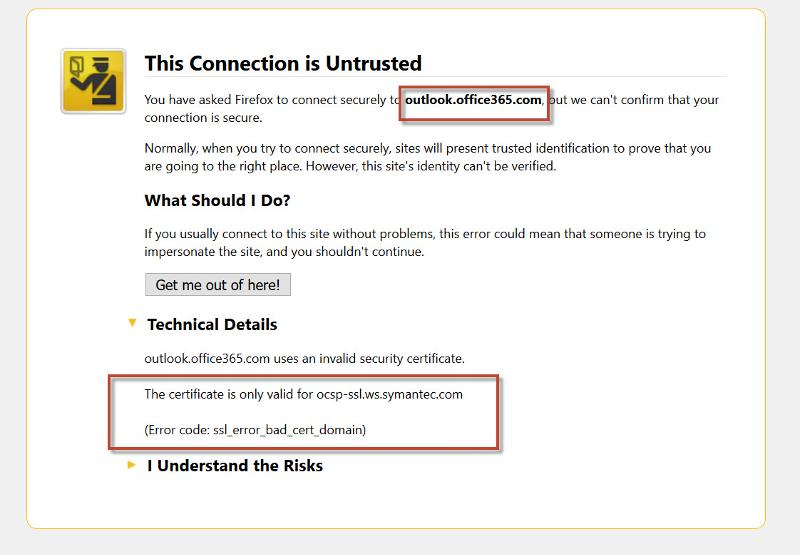"Invalid" SSL certificate issues from home connection
I intermittently have this problem from my home connection. I had this issue before on my older laptop, I am using a brand new laptop now and having the same issue, so this isn't some kind of malware on my system.
I recently switched my home router from using OpenDNS name servers to using Google's name servers, thinking maybe that might help or at least to see if that was related, but still having the problem.
Below is an example of what happens. I try to access a common site in HTTPS (in this case, my Outlook/office365 account), but this happens with other sites and often even when accessing Google.com of Facebook.
It will give me an error that the SSL cert doesn't match, and the cert that the connection is trying to use is often one that sounds like an ad network. This time in the example below it's a symantec cert.
Just to mention - I don't run Symantec on my machine, I use ESET Nod32.
This is a real problem, and I don't understand why this is happening. It later clears up all by itself, but there doesn't seem to be anything I can do to bybass it (other than use FireFox as at least in some cases it lets me "accept" the suspect cert so I can get to where I needed to), but Chrome and IE just refuse to me me access the site that is having this problem at the time.

I have a U-Verse Internet connection, and my router is connected to a wifi router which I use for my entire entire (I only use the U-Verse router to access the Internet and then all traffic is sent to the Cisco/Linksys Wifi Router WRT160n, where I use both the wired and wireless for my entire network.
I recently switched my home router from using OpenDNS name servers to using Google's name servers, thinking maybe that might help or at least to see if that was related, but still having the problem.
Below is an example of what happens. I try to access a common site in HTTPS (in this case, my Outlook/office365 account), but this happens with other sites and often even when accessing Google.com of Facebook.
It will give me an error that the SSL cert doesn't match, and the cert that the connection is trying to use is often one that sounds like an ad network. This time in the example below it's a symantec cert.
Just to mention - I don't run Symantec on my machine, I use ESET Nod32.
This is a real problem, and I don't understand why this is happening. It later clears up all by itself, but there doesn't seem to be anything I can do to bybass it (other than use FireFox as at least in some cases it lets me "accept" the suspect cert so I can get to where I needed to), but Chrome and IE just refuse to me me access the site that is having this problem at the time.

I have a U-Verse Internet connection, and my router is connected to a wifi router which I use for my entire entire (I only use the U-Verse router to access the Internet and then all traffic is sent to the Cisco/Linksys Wifi Router WRT160n, where I use both the wired and wireless for my entire network.
ASKER CERTIFIED SOLUTION
membership
This solution is only available to members.
To access this solution, you must be a member of Experts Exchange.
Thanks for the points. Note that McAfee has it's own removal tool also that you might want to run.
ASKER
I ran the remover. Won't know for a while if this worked since it's intermittent but your solution makes sense thanks.